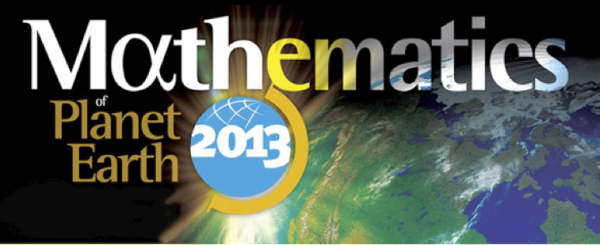MPE2013 is being launched today! The international launch takes place at the winter meeting of the Canadian Mathematical Society in Montreal and coincides with the Canadian launch.
It is already three years since I had the idea of MPE2013. During this time I had email exchanges with more than 100 partners, I was involved in several committees, and I made friends around the world. In the first year it was necessary to be pro-active in order to attract new partners. Also, it took time to get people at the school level interested. The enthusiasm for MPE2013 continued to grow. Now MPE2013 spreads by itself, and new partners join regularly. More countries and regions decide to organize activities for the schools. For instance, in France, the Ministry of Education decided that MPE would be the theme of the 2013 week of mathematics. The Math Awareness Month in the United States will deal with Sustainability. And I just learned that India is organizing a large MPE competition in the schools of the country, with a deadline in mid-June 2013.
Because the international launch of MPE2013 takes place at the winter meeting of the Canadian Mathematical Society in Montreal, several public activities will take place in French. The launch starts with a panel discussion (in French) chaired by the science journalist Pierre Chastenay: “What can mathematics do for the planet?” Ivar Ekeland (UBC and Paris-Dauphine), a great popularizer of mathematics will be one of the panelists.
Ivar Ekeland will also deliver an MPE public lecture, “Une longue histoire: la planète Terre et les mathématiques”. I had fascinating discussions with him, where he explained some of the main challenges of the economy of sustainability: you invest now for benefits to be felt in 50 to 100 years. How do you calculate the interest rates? The second MPE public lecture, “The complex challenge of sustainability,” will be given by Doyne Farmer (Oxford). In his abstract he states: “Sustainability forces us to think clearly about our vision of the future, putting philosophy into direct contact with science.” I had met Doyne at a workshop on “Mathematical Challenges in Sustainability” at DIMACS in November, 2010, and was impressed by his global vision of the planetary problems. It is a challenge for us mathematicians to make sure that we address the real problems, which may require finding new tools and not just applications for the tools that we already have.
The meeting will start with a lecture by Graciela Chichilnisky, a mathematician and economist from Columbia University. Graciela Chichilnisky is scientifically very involved in all questions of sustainability. She introduced the concept of basic needs voted by 153 nations at the UN Earth Summit in 1993. She is also the author of the carbon market of the UN Kyoto Protocol that became international law in 2005. And she was U.S. Lead Author of the Intergovernmental Panel on Climate Change that received the 2007 Nobel Prize. If you read her book Saving Kyoto, you will learn that she is present at these international conferences on climate change and working to influence the final agreements to be signed by the participants. Graciela Chichilnisky is a model of a scientist who combines high-level science with a commitment to saving the planet. She was certainly an inspiration for me during these last years when I was working on MPE2013.
The meeting comprises two other plenary lectures related to MPE. Catherine Sulem (Toronto) will speak of the fascinating subject of large ocean waves like tsunamis. The speed of propagation of such waves depends on the depth of the ocean and also on the bottom topography. Their impact further depends on the shape of the coastline.
Among the four themes of MPE2013, we find a planet supporting life and a planet organized by civilizations. The lecture of Martin Nowak (Harvard) will make the link between these two themes by presenting the role of cooperation in the evolution and in the survival of intelligent life on Earth.
MPE2013 is so successful not only because it is timely, but also because many mathematicians have worked very hard to make it a success. MPE2013 could not have reached the breadth without the immense role played by the American Institute of Mathematics (AIM) and its Director, Brian Conrey. Today I thank all the others globally, but I will certainly present them individually to you in my future blogs.
Christiane Rousseau
